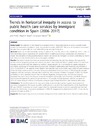Please use this identifier to cite or link to this item:
https://accedacris.ulpgc.es/jspui/handle/10553/58404
| Title: | Trends in horizontal inequity in access to public health care services by immigrant condition in Spain (2006-2017) | Authors: | Pinilla, Jaime Negrín, Miguel A. Abásolo, Ignacio |
UNESCO Clasification: | 531207 Sanidad | Keywords: | Horizontal equity in access Economic immigration Public health care services National health surveys |
Issue Date: | 2019 | Project: | ECO2016–79588-R | Journal: | International Journal for Equity in Health | Abstract: | Background: The objective of this research is to analyse trends in horizontal inequity in access to public health services by immigration condition in Spain throughout the period 2006-2017. We focus on "economic immigrants" because they are potentially the most vulnerable group amongst immigrants. Methods: Based on the National Health Surveys of 2006-07 (N = 29,478), 2011-12 (N = 20,884) and 2016-17 (N = 22,903), hierarchical logistic regressions with random effects in Spain's autonomous communities are estimated to explain the probability of using publicly-financed health care services by immigrant condition, controlling by health care need and other socioeconomic and demographic variables. Results: Our results indicate that there are several horizontal inequities, though they changed throughout the decade studied. Regarding primary care services, the period starts (2006-07) with no global evidence of horizontal inequity in access (although the analysis by continent shows inequity that is detrimental to Eastern Europeans and Asians), giving way to inequity favouring economic immigrants (particularly Latin Americans and Africans) in 2011-12 and 2016-17. An opposite trend happens with specialist care, as the period starts (2006-07) with evidence of inequity that is detrimental to economic immigrants (particularly those from North of Africa) but this inequity disappears with the economic crisis and after it (with the only exception of Eastern Europeans in 2011-12, whose probability to visit a specialist is lower than for natives). Regarding emergency care, our evidence indicates horizontal inequity in access that favours economic immigrants (particularly Latin Americans and North Africans) that remains throughout the period. In general, there is no inequity in hospitalisations, with the exception of 2011-12, where inequity in favour of economic immigrants (particularly those from Latin America) takes place. Conclusions: The results obtained here may serve, firstly, to prevent alarm about negative discrimination of economic immigrants in their access to public health services, even after the implementation of the Royal Decree RD Law 16/2012. Conversely, our results suggest that the horizontal inequity in access to specialist care that was found to be detrimental to economic immigrants in 2006-07, disappeared in global terms in 2011-12 and also by continent of origin in 2016-17. | URI: | https://accedacris.ulpgc.es/handle/10553/58404 | ISSN: | 1475-9276 | DOI: | 10.1186/s12939-019-1092-1 | Source: | International Journal for Equity in Health [ISSN 1475-9276], v. 18(185) |
| Appears in Collections: | Artículos |
SCOPUSTM
Citations
1
checked on Jun 8, 2025
WEB OF SCIENCETM
Citations
1
checked on Feb 25, 2024
Page view(s)
76
checked on Jan 10, 2026
Download(s)
80
checked on Jan 10, 2026
Google ScholarTM
Check
Altmetric
Share
Export metadata
Items in accedaCRIS are protected by copyright, with all rights reserved, unless otherwise indicated.
